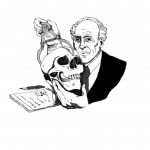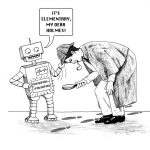Whew! (Stamp, stamp.) I guess I was away for a little bit longer than I expected. Three years, has it been? Well, let me put some tea on the stove and then I’ll tell you about what has happened since my last visit.
Ah, that’s better. Well then, last time I was here, the What’s Happening series was still on volume 9. Volume 10 came out last year, with an assist from Barry Cipra, who wrote three out of nine chapters. If you’re interested in reading some slightly old news about mathematics, you can of course order it from the American Mathematical Society. The six chapters I wrote were about the work of Yitang Zhang on prime pairs; the proof of the Kadison-Singer Conjecture; the curious problem of how to tell which direction a bicycle went just by looking at the path taken by its tires (sometimes you can’t!); mathematical origami; the mathematics of climate change; and finally sports analytics, the data-intensive approach to sports that gave us Moneyball and ended the World Series droughts of the Boston Red Sox and Chicago Cubs.
Even before What’s Happening 10 came out, I was starting work on a new project, called The Book of Why: The New Science of Cause and Effect. I’m sure that I will have much more to say about this book as it gets closer to publication date (spring 2018), but here is the teaser.
The Book of Why introduces the reader to a scientific revolution that has taken place in the last three decades, which has for the first time provided a comprehensive mathematical framework for answering questions about cause and effect. For many years statisticians taught their students (and other scientists) to avoid such questions. The prototypical example was the question: “Does smoking cause cancer?” No one would quarrel that smoking and lung cancer were related or associated, because the data showed clearly that they were. But statisticians objected (some of them strenuously) to any claim that we understood why. The tobacco companies were only too eager to exploit this reticence to sow doubt in the public mind, and always to say that “more study is needed.” Meanwhile, thousands of people were dying unnecessarily due to smoking-induced lung cancer.
The absurd taboo (*) against speaking of causes and effects in science has now been lifted, thanks in large part to the work of my co-author, Judea Pearl of UCLA. In this book we explain how scientists can make statements about cause and effect, even in cases when they cannot conduct randomized experiments. The book is liberally seasoned with examples, such as climate change (how sure can we be that man-made global warming caused this heat wave or that storm?) and law (how can we prove that a company discriminates against women, from data alone?). We also have a fun chapter on paradoxes, in which we show that such brain-teasers as the Monty Hall paradox and Simpson’s paradox are really misunderstandings about causation.
Hopefully that has whetted your appetite for more! But let me move on now to my third and final news item, about one of my older books, The Universe in Zero Words. To my complete surprise, I learned last week that the Italian edition of this book, called l’Universo senza Parole, has been short-listed for the Premio Asimov. This is a prize for popular science books (in Italian), administered by the Gran Sasso Scientific Institute. It’s a literary prize with a twist: the jury consists of 1,400 high-school students!
This delights me in so many ways. First, I am very impressed that the prize committee was able to find more than a thousand students who were willing to vote on their favorite current science books. I think this says something about the quality of the Italian educational system. Also, while I was writing The Universe in Zero Words, I often thought of my readers as bright teenagers who wanted to learn more than their teachers could tell them. This doesn’t mean it’s a “young adult” book — I wanted to reach adult readers too — but nevertheless I’m thrilled to have my book judged by this age group. If they like it, I will feel as if I have accomplished one of my goals.
So that’s what is new. I imagine that updates will be coming more frequently in the year ahead, and perhaps there will even be a re-design of the whole website. But that remains to be seen …
(*) A friend of mine who is an M.D. told me a joke (which I did not put in the book) about the willful blindness of scientists toward causation. One morning a scientist had a big argument with his wife. When he came back home that evening, he found that she had moved out of the house. “Oh well,” he said. “It’s only an association.”
If you don’t get this joke, you haven’t had your worldview warped by graduate school yet. Congratulations!



